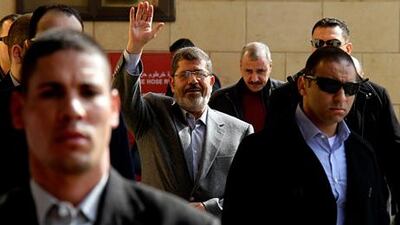CAIRO // The Egyptian president, Mohammed Morsi, yesterday presided over a shake-up of the cabinet, replacing 10 of the 36 ministers as his government comes under increasing pressure to introduce measures to correct a teetering economy.
The Egyptian pound has undergone the beginnings of a managed devaluation, hitting a new low of 6.45 pounds to US$1 yesterday. The lower value of the pound is already pushing up prices of goods and could hasten the effects of government austerity measures planned for the forthcoming months.
Mr Morsi delayed signing a $4.8 billion (Dh17.6bn) loan with the International Monetary Fund (IMF) last month amid the political crisis surrounding the vote on the controversial new constitution.
The charter passed in a national referendum but the president has not indicated a new timeline for signing the loan arrangement.
The IMF loan itself would not provide enough funds to end Egypt's economic woes but analysts said it may presage a boost in funding from other sources because it would signal to donors and international businesses that Egypt is stabilising and implementing an economic programme that gets the country back on track.
Continuing in the tradition of his first cabinet, Mr Morsi's appointees were mostly technocrats from within the lower rank ministries and included no well-known figures. Three of the new ministers were members of the Muslim Brotherhood, bringing the total number of Brotherhood ministers to eight, according to the Brotherhood's Freedom and Justice Party.
Samir Radwan, a developmental economist who served as Egypt's minister of finance from February to July 2011, called the cabinet reshuffle "cynical" and "unambitious".
"It does not meet people's expectations," he said. "The demand was for a totally new cabinet and a new prime minister, but the president only changed less than a third of the ministers."
Mr Radwan said that Mr Morsi's choice for the new finance minister was especially baffling because he is a "complete unknown".
Elmorsy Hegazy, a professor of public finance at Alexandria University, who became the minister of finance, is only known for a book he wrote about Islamic taxation, Mr Radwan said.
Momtaz Al Saeed, the outgoing finance minister, was removed because he disagreed with the president over the greater use of Islamic loans, known as sukuk, he added. "The Egyptian people were hoping for an economic team that gets them out of this dire economic situation but I don't see this happening," Mr Radwan said.
Mr Hegazy yesterday said he was "completely ready to complete discussions" with the IMF. A senior IMF official was also scheduled to meet Mr Morsi today about the loan.
The ministry of interior, which oversees the country's police forces and internal security, will be taken over by General Mohamed Ibrahim. He was an assistant of the former minister and head of the prison service, according to the Al Ahram newspaper.
"He is not very well-known," said Ihab Youssef, a former official in the ministry of interior who runs the security advisory company, Risk Free Egypt. "We are still trying to find out more about his background."
Hatem Abdel Latif, a professor of engineering at Ain Shams University, is the new transportation minister. The previous minister, Rashad El Metiny, was sharply criticised following a November train collision with a school bus in the southern city of Assiut where 50 children were killed.
The members of the Muslim Brotherhood who were appointed as new ministers included Mr Abdel Latif; Bassem Ouda, the minister of supply and domestic trade; and Mohamed Ali Beshr, the minister of local development.
The heads of the ministry of electricity, ministry of communication and technology, ministry of state for legal and parliamentary affairs, ministry for civil aviation and ministry of state for environmental affairs were also replaced.
Mr Morsi first suggested the cabinet changes last month in a speech intended to heal the rifts that erupted in the past number of weeks and focus the country's efforts on the economy.
Opposition forces demonstrated by the thousands in November and December against Mr Morsi's attempts to shield his decisions from judicial oversight and to rush through a referendum on a polarising constitution.
"The coming days will witness, God willing, the launch of new projects ... and a package of incentives for investors to support the Egyptian market and the economy," Mr Morsi said on December 27.
"I will deploy all my efforts to boost the Egyptian economy, which faces enormous challenges but has also big opportunities for growth and I will make all the changes necessary for this task."
* With additional reporting by Reuters
Follow
The National
on
& Bradley Hope on

